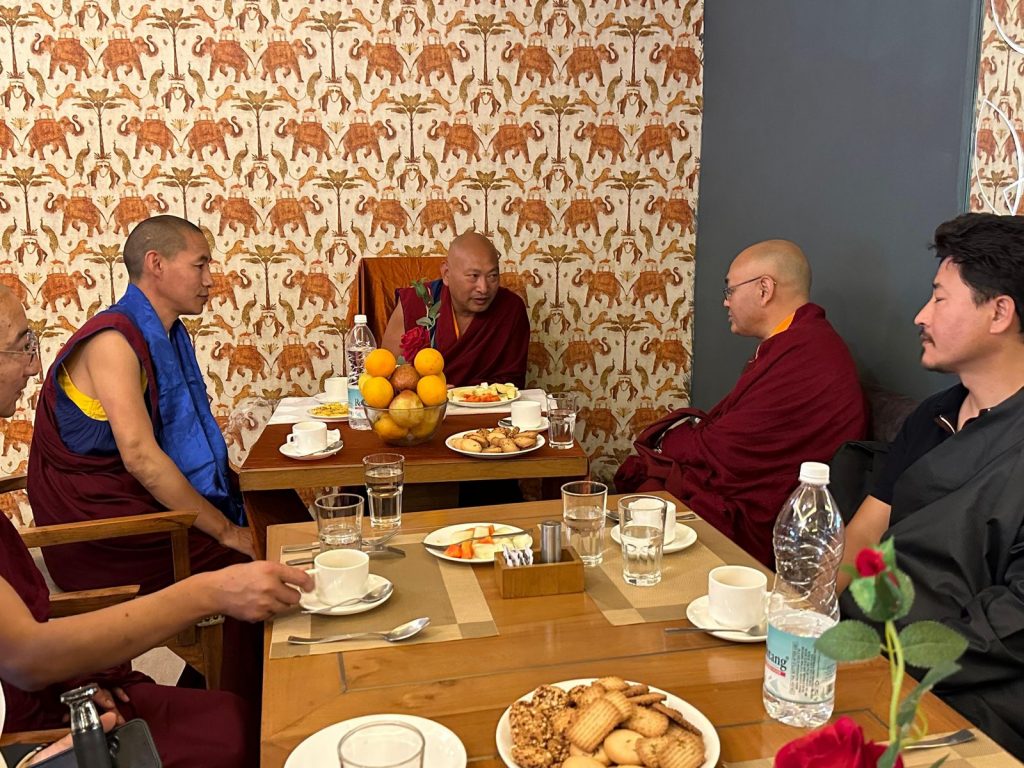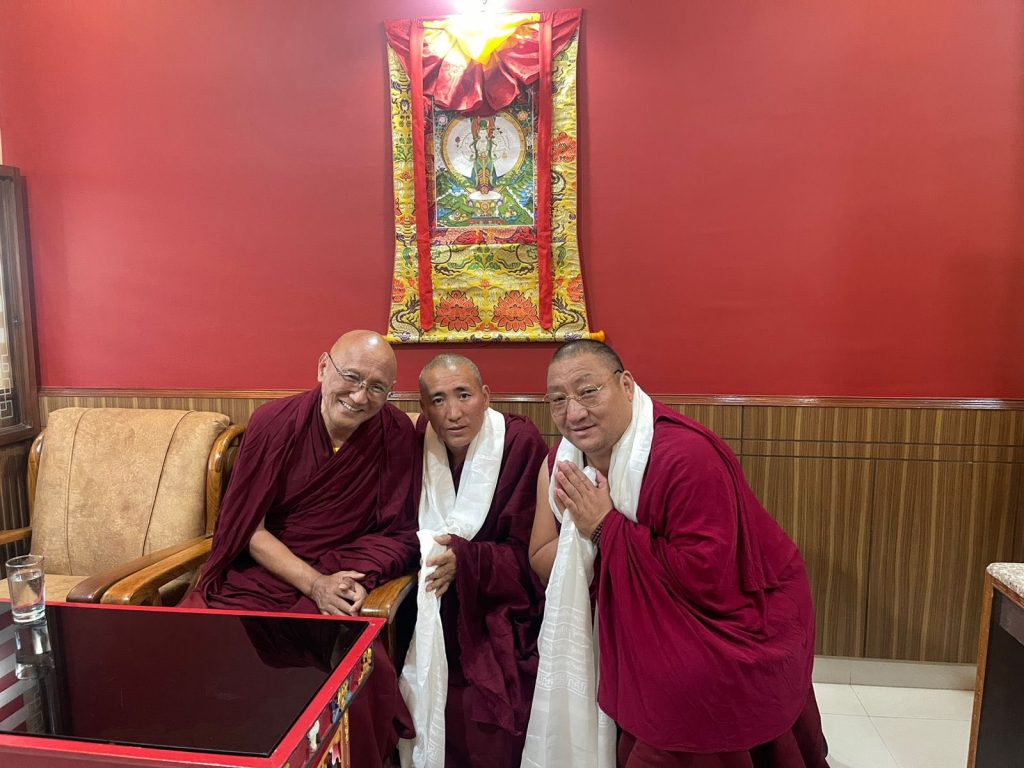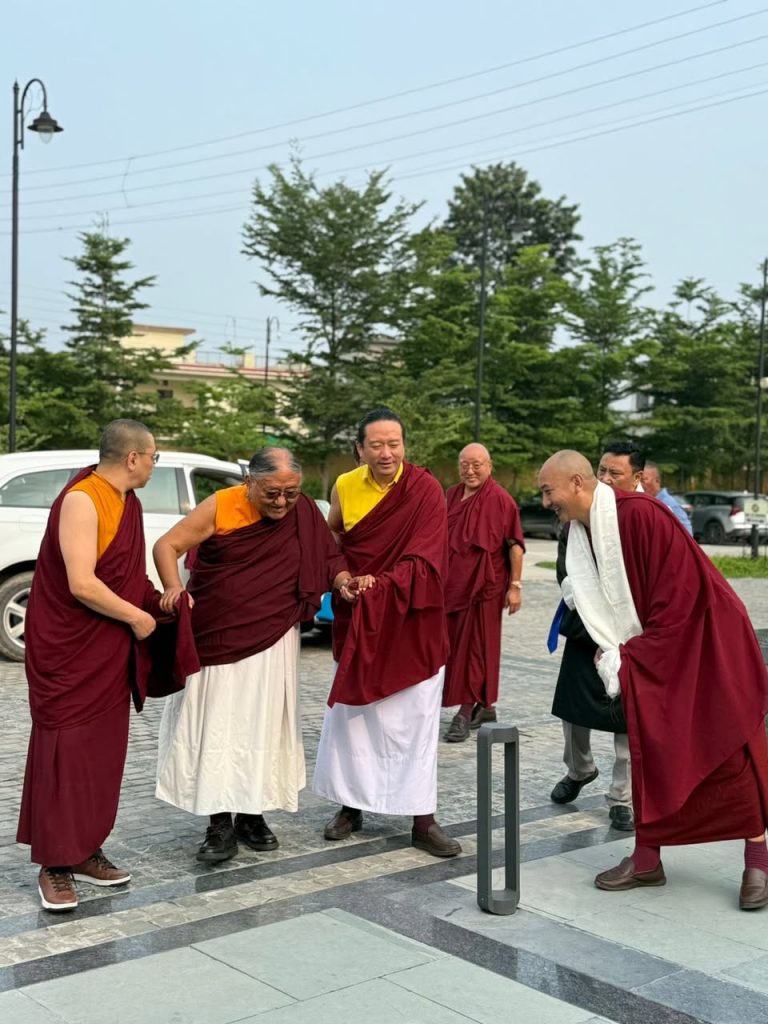Today marks a historic milestone as we celebrate the 64th anniversary of the establishment of democracy within the Tibetan exile community. It was His Holiness the Dalai Lama, revered as the lord of the victorious ones, the supreme temporal and spiritual leader of the Tibetan people, and a great champion of world peace, initiated this democratization process upon his arrival in exile in India in 1959. His Holiness took this step with deep consideration for both the immediate and long-term wellbeing of the Tibetan people. He not only granted the Tibetan people the gift of democracy but also offered profound guidance for its realization. It was through this leadership, provided by His Holiness the Dalai Lama, aimed at establishing a democratic political system, that the Tibetan people were able to vote for their first parliament in exile, exercising their choice freely and ensuring equality and fairness. Thus, democracy was established as the foundation of the Central Tibetan Administration on September 2, 1960, when the first Tibetan Parliament-in-Exile members took their oath of office. This date has been observed annually as the anniversary of Tibetan democracy since September 2, 1975.
Even before Tibet lost its independence, His Holiness the Dalai Lama had wished to reform the existing political system, following his assumption of both political and spiritual responsibility for the country. However, due to the Chinese government’s armed occupation of the country at that time, his ability to implement these reforms was severely limited.
Upon entering exile, His Holiness immediately focused his efforts on establishing an efficiently run Tibetan government in exile, characterized by a representative democratic system that would embody the will of the Tibetan people. However, at that time, the Tibetan public had limited understanding of democracy and little inclination toward it, which could have posed challenges to implementing such a system. Nevertheless, His Holiness the Dalai Lama remained mindful of both immediate and long-term interests of the Tibetan people. Demonstrating his deep concern, he consistently offered guidance on the benefits of the democratic system and the drawbacks of not having it in his speeches. Through this persistent effort, His Holiness played a crucial role in promoting and establishing the value of democracy within the Tibetan community in exile. The development of Tibetan democracy stands as a remarkably rare achievement in world history. As we know, the establishment of democratic systems in most countries has often involved significant struggles and sacrifices. In contrast, the progress of democracy within the Tibetan community in exile is solely attributed to the vision and efforts of His Holiness the Dalai Lama.
The democratic system of the Tibetan exile community, free from the partisanship of political parties, is uniquely defined by the strengths of both presidential and parliamentary systems. Its development began in 1963 with the issuance of a proclamation for a democratic constitution for a future free Tibet. This was followed in 1991 by the adoption of the Charter of Tibetans in Exile by the 11th Tibetan Parliament-in-Exile, which received formal assent from His Holiness the Dalai Lama. Since then, the Tibetan Parliament-in-Exile has served as the law-making body it remains today. In 1992, the Tibetan Supreme Justice Commission was established as the judicial organ of the Central Tibetan Administration. Additionally, in 2001, the system was introduced allowing the Kalon Tripa of the Central Tibetan Administration to be elected directly by the Tibetan public. Taking into consideration a multitude of current and long-term concerns and interests affecting the Tibetan people, His Holiness the Dalai Lama, in 2011, devolved his political authority to the democratically elected leaders of the Tibetan community. In line with this decision, the Charter of Tibetans in exile, along with related laws, rules, and regulations, was redrafted by the Tibetan Parliament-in-Exile in 2011 to ensure they were adapted to the realities of our situation in exile. The Tibetan Parliament-in-Exile has continued to amend the provisions of these legislations as and when the need arose. As a result, the entire functioning of the Central Tibetan Administration has continued to operate under a democratic system governed by the rule of law, based on the laws, rules, and regulations passed by the Tibetan Parliament-in-Exile. Moreover, under the profound guidance and benevolence of His Holiness the Dalai Lama, we, the Tibetan people, have successfully maintained an organized system of administration that fully meets the criteria of a democracy—one unparalleled by any other refugee community in the world.
As Tibetan people living in exile, we have been able to enjoy democratic rights in our religious, cultural, educational, economic, and social freedoms. We owe this remarkable progress entirely to the kindness of His Holiness the Dalai Lama. However, it is crucial that we exercise these rights and freedoms responsibly within the democratic system. Given the critical nature of our situation today, it is imperative that all Tibetans commit to unity and the just struggle for Tibet, as well as to the preservation and promotion of our religious, linguistic, and cultural heritage.
Regarding our fellow Tibetans living under Chinese occupation, it is evident that they are completely deprived of any democratic political system. Instead, the brutality of the Communist Party of China’s hard-line policies, under which they continue to suffer as if in a living hell, becomes increasingly evident with each passing day. With the goal of eradicating the Tibetan race and language, the Chinese government has forcibly relocated over one million young Tibetan children to separate boarding schools, where they are subjected to policies designed to Sinicize them. Additionally, for many years, China has pursued a policy of Sinicizing Tibetan religion and culture by destroying existing centers dedicated to their practice and preservation. On July 12, 2024, the Chinese government issued a coercive order to immediately shut down the Golog Ragya Gangjong Sherig Norbu Lobling, an academy established in 1994 with all necessary permissions from various Chinese authorities. Over its nearly thirty years of operation, the academy had graduated over 2,500 scholars and had hundreds of students enrolled at the time of the closure order. This abrupt shutdown was a profound shock to both students and staff, and it deeply saddened the Tibetan people both in Tibet and in exile, as well as those worldwide who value Tibetan culture.
Similarly, starting around May this year, local Chinese authorities issued an order mandating the transfer of hundreds of young novice monks from Ngaba Kirti Monastery and Taktsang Lhamo Kirti Monastery to government-run schools, resulting in their expulsion from the monasteries. To enforce this order, the Chinese government has harassed and threatened the parents and relatives of these young monks. This policy appears to aim at eradicating the continuity of religious scholarship and practice in Tibetan monasteries, akin to cutting off a river’s source. Consequently, it is crucial for us to intensify our global advocacy and campaigning for Tibet, urging the Chinese government to immediately halt its brutal policies that seek to destroy Tibetan religion, culture, and identity.
In May this year, a delegation from the Tibetan Parliament-in-Exile and the Kashag of the Central Tibetan Administration attended the oath-taking ceremony of the 16th President and the Vice President of Taiwan, following an official invitation. Apart from that, a ceremony was held for the inauguration of the Taiwanese Parliamentary Group for Tibet following the election of the country’s 11th Legislative Yuan (Parliament). At that time, a total of 31 members belonging to three political parties in Taiwan signed up to join the group.
In conjunction with the recent budget session of the Indian Parliament in New Delhi, a delegation from the Standing Committee of the Tibetan Parliament-in-Exile, led by the Speaker and divided into two groups, conducted an outreach campaign to garner support for the Tibet issue. From August 5 to 9, the delegation met with two Union Ministers, 28 Members of Parliament from both the Lok Sabha and Rajya Sabha, representing 18 states and 11 major political parties in India. They also held discussions with 44 other prominent Indian leaders, including political party heads. The delegation used these meetings to inform Indian leaders about the critical situation in Tibet under Chinese rule. In particular, the delegation took part in the inaugural ceremony for the revival of the All Party Indian Parliamentary Forum for Tibet (APIPFT). The event successfully concluded with the appointment of Shri Bhartruhari Mahtab, Member of Lok Sabha, as Convener, and Shri Tapir Gao, Member of Lok Sabha, as Co-convener.
The situation in Tibet continues to deteriorate. In response, members of the Tibetan Parliament-in-Exile are actively engaging internationally to campaign for the Tibetan cause, raise global awareness, and garner support. In August of this year, a delegation from the Tibetan Parliament-in-Exile successfully completed an advocacy program in Australia and New Zealand. Similarly, in August, a delegation participated in the International Leaders Forum in Chicago, organized by the National Democratic Institute, where they achieved significant success in advocating for Tibet. In the coming months of October and November, delegations from the Tibetan Parliament-in-Exile are scheduled to tour European countries to further advance their campaign for Tibet.
Recently On July 12, President Joe Biden signed into law the “Promoting a Resolution to the Tibet-China Dispute Act” (or “Resolve Tibet Act”), which had previously passed both chambers of the U.S. Congress with a supermajority vote. This legislation is now officially part of U.S. government policy. This legislation clarifies that “claims made by officials of the People’s Republic of China and the Chinese Communist Party that Tibet has been a part of China since ancient times are historically inaccurate”. The Act is a significant legal document that reinforces the U.S. government’s policy on Tibet. It was introduced as an amendment to the Tibetan Policy Act of 2002, modifying certain provisions of that Act. The Resolve Tibet Act follows other important legislation, including the Tibetan Policy and Support Act of 2020 and the Reciprocal Access to Tibet Act of 2018. We extend our deep gratitude to the members of the U.S. Congress and all those who have worked tirelessly at various stages to bring this legislation to fruition.
For over six decades, the government and people of our host country, India, along with various foreign governments and peoples, have provided unwavering support, guidance, and assistance to the Tibetan people in exile. Their efforts have been crucial in preserving our religious, cultural, and linguistic identity, as well as in supporting our just struggle. On this occasion, we extend our profound gratitude to all who have contributed to these vital causes.
Finally, we pray that His Holiness the Dalai Lama—beloved friend to all sentient beings, a champion of world peace, and the esteemed leader of the Tibetan people both in Tibet and in exile—may live for countless aeons. May all his noble wishes be fulfilled effortlessly, and may the just cause of Tibet be realized.
The Tibetan Parliament-in-Exile
September 2, 2024
. . . . . . . . . . . . . . . . . . . . . . . . . . . . . . . . . . . . . . . . . . . . . . . . . . . . . . . . . . . . . . . . . . . . . . . . . . . . . . . . . . . . . . . . . . . . . . . . . . . . . .
* In case of any discrepancy between this English translation and its Tibetan original, the latter should be considered as authoritative and final for all purposes.




